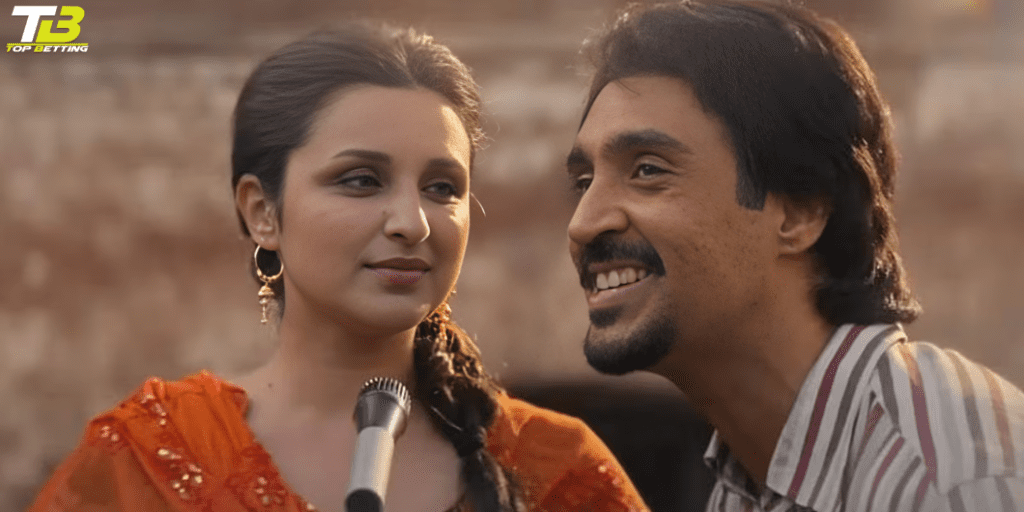
Diljit Dosanjh delivers a delectable act
Review of Chamkila: Imtiaz Ali’s newest musical has Diljit Dosanjh as the flawless portrayal of Punjabi musician Amar Singh Chamkila.
Jis wajah se chamka woh, uss wajah se tapka woh – these lyrics from Amar Singh Chamkila‘s opening song, which is a biographical song about one of Punjab’s most well-known singers, essentially lay out the plot. After a four-year hiatus, Imtiaz Ali returns to directing, meticulously selecting even the smallest aspects from the singer’s life to craft a gripping story that culminates in a stunning film with impeccable storytelling.
The movie immerses you in Chamkila’s life from the outset, showing you his ascent and decline as a musician as well as how his own success and notoriety ultimately contributed to his premature death.
Biopics frequently veer off course in an attempt to depict a variety of facets of a subject’s life; nevertheless, Imtiaz is here to present us with the true picture of Amar Singh Chamkila, popularly referred to as the “Elvis Presley of Punjab.” It turns out that casting Diljit Dosanjh was a safe choice, not just because of language barriers but also since the singer-actor is from the same state and must have grown up listening to Chamkila’s music. As a result, Diljit Dosanjh‘s portrayal of the late artist looks incredibly realistic, and his physical attributes, mannerisms, and singing style are all very true to the late singer. To the extent that Diljit gave up his turban in order to resemble Chamkilaand he gives a mouthwatering performance that makes you want more.
Parineeti Chopra, on the other hand, does a respectable job as Amarjot, albeit it seems that Diljit’s star power eclipses her. In the movie, Parineeti sings 15 songs together, but to be honest, her performance isn’t very memorable.
The storyline
As they arrive for a performance in Mehsampur, Chamkila (Diljit Dosanjh) and his wife Amarjot, also known as Babbi (Parineeti Chopra), are shot and killed. We are told through a series of flashbacks how he became one of the most important singers in Punjab and what ultimately led to his murder when their bodies were thrown into the Phillaur station.
The film follows the story of an aspiring singer named Chamkila who works in a socks-knitting factory. He meets an established artist named Shinda and eventually gets that one break in a non-linear narrative that spans 1977 to 1988. Chamkila begins penning songs for him, and one day, as he fills in for Shinda on stage at an akhada (a gathering place for live music), he captures the hearts of onlookers with his unique approach. His records start selling like hot cakes, and he becomes an overnight sensation. Although he is sometimes described to as “ganda banda,” admirers of all ages consistently want to hear his music despite the fact that he writes, composes, and sings offensive songs with bold lyrics.
Excellent dialogue and poignant scenes
The film features some strong and thought-provoking dialogue that makes you sit up and take notice, written by Imtiaz and his brother Sajid. When asked to explain the filthy songs he creates and performs, he responded, “Har kisi ki sahi galat sochne ki aukaat nahi hoti.” Meri toh nahi hein. Toh bas zinda rehna hai mujhe mujhe.
There’s a portion in the film where a press reporter comes to interview Chamkila and insists on talking to him alone and ask some personal questions. He’s reluctant to an extent that he won’t even make an eye contact with her, because she is wearing pants. Here, the film unapologetically showcases the hypocrisy that has plagued our society for long where a singer can write songs about women’s sexuality, objectify them in unimaginable ways but has issues with their modern clothing.
I adored Imtiaz’s decision to not attempt any image correction for Chamkila in this biopic. He uses a catchy song to showcase the artist in his most natural state. Knowing the intended humour and humour in the lines Diljit was known for can make you enjoy every time he takes the stage and performs a new song if you speak Punjabi well. Imtiaz has cleverly employed supers (Hindi translation on screen) to make it simple for you to understand the flow even if you don’t speak the language.
But every time the supers appear on screen during a song, it can be a bit distracting and you won’t know whether to concentrate on the performers on stage or the words being written. You can still enjoy the musical despite that problem. Even though Chamkila’s story is already incredibly vivid, Imtiaz has elevated it even further by giving some of the images an additional layer of 2D movement.
Many conspiracy theories have been put up regarding Chamkila’s death. These have claimed that he was assassinated by separatists, that rivals who were jealous of him killed him, or that certain religious organisations didn’t want him to tarnish society and deceive and corrupt young people’s minds. Thankfully, the movie stays away from delving too much into the riddle and becoming a chase between cats and mice. Rather, Imtiaz’s only goal is to introduce his listeners to Chamkila—the man, the singer, the spouse, and the celebrity he eventually rose to fame.
In the movie, there are several touching moments where you recognise that Chamkila’s music has always found an audience, whether it is performed in public or privately. The part where the investigating police officer is revealed to quietly admit that he also secretly loved Chamkila’s music is one of my favourites. Another heartwarming moment is when, rather of scolding his little kid for not studying, he gently instructs him to listen to Chamkila’s music whenever he feels likeit.
The devastating 1984 riots that rocked Punjab and left artists fearing for their future are also discussed in the movie. At this point, the movie pauses to highlight Chamkila’s naivete as the owner of a music company (Kumud Mishra) persuades him to keep recording music by saying, “Jab duniya mein tanaav badhta hai, tab junta ke andar entertainment ki bhookh aur bhi badh jati hai.” We hear another conversation that serves as more encouragement for him to resist giving in to peer pressure and keep penning the same old tunes that fans loved and wanted to hear.
“Jab chaaron taraf khatra ho, log takleef se tadap rahe ho, bukh toh pehle se hi unki zindagi mein hai, dukh unhe dukh bhare gaane nahi sunne hote.” As soon as you reach the end of your life, you will be able to look back on it with pride. The way Chamkila decides to amuse people and help them forget their problems is written so exquisitely that it just sticks in your memory.
The film’s soundtrack, which was masterfully composed by AR Rahman and features lyrics by Irshad Kamil, is another standout. Ishq Mitaye creates the ideal atmosphere for a melancholic song, but Vida Karo is a depressing song that makes your throat hurt. The film’s strong point is the fifteen songs that Diljit and Parineeti live recorded in their own voices for their stage shows. Additionally, Imtiaz chose to include the lively song Naram Kaalja, which depicts women—from college girls to middle-aged women to the elderly in the home—openly discussing their sexual wants during those awkward times when women weren’t comfortable coming up about their sexuality. All you want to do is get up and give a loud cheer!

Watch Amar Singh Chamkila for its music, fun, spirited, honesty, and purity. It’s the equivalent of going to a live concert, and Diljit, Imtiaz, and AR Rahman are an incredible trio. Netflix is currently streaming the movie.










